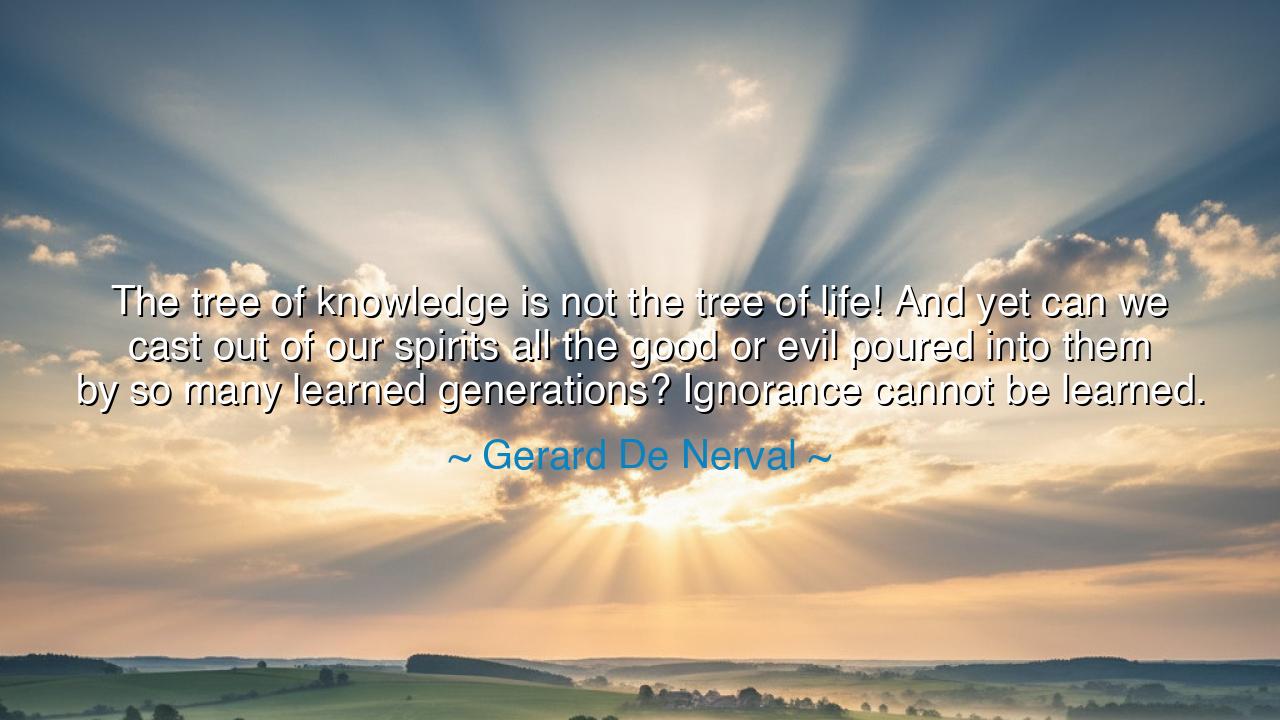
The tree of knowledge is not the tree of life! And yet can we
The tree of knowledge is not the tree of life! And yet can we cast out of our spirits all the good or evil poured into them by so many learned generations? Ignorance cannot be learned.






The words of Gérard de Nerval resound like an echo from the depths of the human soul: “The tree of knowledge is not the tree of life! And yet can we cast out of our spirits all the good or evil poured into them by so many learned generations? Ignorance cannot be learned.” In this utterance, there lies both lament and revelation. He reminds us that knowledge—though vast, profound, and mighty—is not the same as life itself. To know is not always to live, and to live is not always to know. The scholar may hoard libraries of wisdom, yet die empty of joy; the humble peasant may barely read, yet drink deeply of life’s fountain. Knowledge fills the mind, but life fills the soul.
And yet, Nerval warns, knowledge cannot be cast away once it has entered. The teachings of the past—be they good or evil—flow into us like rivers into the sea. We are shaped not only by our own thoughts, but by the voices of countless generations that whisper through books, traditions, and memory. We cannot unlearn civilization, nor return to the innocence of Eden. Once the fruit of the tree of knowledge has been tasted, its sweetness and its bitterness remain forever in the spirit.
The story of Prometheus illustrates this truth. He brought fire—symbol of knowledge—to mankind, lifting them from darkness into skill, craft, and power. But with the gift came also toil, suffering, and unending struggle. Humanity could not return to its former ignorance, for the flame once kindled cannot be extinguished. They had eaten from the tree of knowledge, but it was not the tree of life; it did not grant immortality or peace, but burdened them with the double-edged sword of progress. Prometheus himself was chained for his gift, showing that wisdom carries not only liberation but also torment.
Consider too the tale of the modern age, when men split the atom. The brilliance of scientific discovery shone like a sun, but from it came both boundless energy and weapons of unspeakable destruction. Can humanity now “unlearn” the knowledge of nuclear fire? Never. The fruit has been consumed, and its taste cannot be forgotten. Ignorance cannot be relearned. Thus, the destiny of man is not to retreat into simplicity, but to learn how to wield knowledge without destroying life.
From this, we must draw the lesson that knowledge must be guided by wisdom, and wisdom must be guided by compassion. The tree of life is nourished not by facts or formulas, but by love, justice, and reverence for existence. Knowledge without life becomes cold, a machine devouring its maker. But life without knowledge becomes blind, stumbling into folly. Only when both are joined—the clarity of knowledge and the fullness of life—does humanity flourish.
So, what should we do, O seekers of truth? Do not despise knowledge, nor idolize it. Do not believe that books alone will make you whole, nor imagine that ignorance is salvation. Instead, let knowledge serve life. Read, learn, and think deeply—but then step into the sunlight, laugh with children, labor with your hands, suffer with the brokenhearted, rejoice with the joyful. In doing so, you join the fruit of knowledge to the root of life.
Above all, remember Nerval’s cry: “Ignorance cannot be learned.” You cannot return to innocence, but you can move forward into wisdom. You cannot erase the past, but you can transform its burdens into blessings. Carry the gifts of generations not as chains, but as torches. Use what you know not to dominate, but to nurture; not to wither life, but to strengthen it.
For in the end, the eternal truth is this: the tree of knowledge is not the tree of life—but together, they may yet form the garden of humanity’s salvation.






AAdministratorAdministrator
Welcome, honored guests. Please leave a comment, we will respond soon